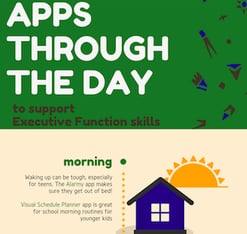Here's a glimpse into a typical morning when I was in high school...
My sleep fogged brain hears my alarm as if from a distance. I had stayed up until 2:30am finishing a paper  for history that I should have started weeks ago. I gather up enough strength to make the noise stop by snoozing my alarm until my mother encourages me out of bed. After dressing, I can’t remember if I brushed my teeth and I check to see if my toothbrush is wet. There’s no time to eat but I’m not concerned, since I hardly ever eat breakfast. The refreshing effects of my morning walk to school don't last long; I have trouble staying alert and focusing in my classes. Of course, I blame this on the boring material and teachers. I just feel so drained. Information that I should know is hard for me to recall. I find myself overly sensitive to my friends’ teasing and I'm on the verge of tears all day.
for history that I should have started weeks ago. I gather up enough strength to make the noise stop by snoozing my alarm until my mother encourages me out of bed. After dressing, I can’t remember if I brushed my teeth and I check to see if my toothbrush is wet. There’s no time to eat but I’m not concerned, since I hardly ever eat breakfast. The refreshing effects of my morning walk to school don't last long; I have trouble staying alert and focusing in my classes. Of course, I blame this on the boring material and teachers. I just feel so drained. Information that I should know is hard for me to recall. I find myself overly sensitive to my friends’ teasing and I'm on the verge of tears all day.
Day after day, this was the reality of high school for me and many of my friends.
Now that I am an adult looking back on this childhood memory, I recognize how establishing healthy sleep habits and building my Executive Function skills have provided me with insight and knowledge that allow me to teach others these skills. In other words, I am equipped to help my students avoid the struggles I had faced at their age.
As an Executive Function coach and school psychologist, I observe how sleep deprivation affects my students’ behavior. When put on the spot, students admit to staying up late watching Netflix, playing video games, texting with friends, or spending time on social media. Alternatively, there are students who stay up late doing schoolwork due to poor planning and time management skills that make last minute crises a daily occurrence. Other students suffer from anxiety or sleep disorders that impact their sleep. Yet teens are usually clueless about the importance of sleep and so the cycle of exhaustion continues daily. It can make you wonder if sleep deprivation is the new normal for teens.
Lack of sleep affects Executive Functioning
Studies have revealed a connection between difficulty with Executive Function and sleep deprivation. Because Executive Function skills develop over the course of years in a child, researchers believe that chronic sleep disruption can affect the course of development of these self-management abilities. The exact nature of this link is still being researched. However, taking steps to ensure that our children consistently have an adequate night’s sleep is an important step to improve their ability to self-manage.
If your child has a diagnosis of ADHD, your pediatrician may want to inquire about any sleep problems your child is experiencing. If your child is taking medication for ADHD and is suffering from side effects that impact sleep, discuss these difficulties with the doctor prescribing the medication. Although sleep does not appear to have the power to eliminate ADHD symptoms, studies have shown that not getting enough sleep can worsen ADHD symptoms.
While it seems that everyone has heard of ADHD, people are often less familiar with sleep disorders, which can have a number of causes. A few of the more common sleep disorders are obstructive sleep apnea, restless leg syndrome, and delayed sleep phase syndrome. Helpful information about these and other sleep disorders can be found on NYU Langone’s website. If you believe that your child may be suffering from a sleep disorder, speak with your child’s pediatrician about the symptoms.
What can parents do to improve their child’s sleep?
According to the Centers for Disease Control, here are some habits that can help promote healthy sleep:
- Establish a consistent bedtime routine and schedule (even on weekends)
- Create a quiet, dimly lit sleep environment
- Shut down electronics and remove them from the bedroom
While you may have noticed how sleep deprivation can affect your child’s behavior, you may not have realized the impact it can have on improving Executive Function Skills. Sufficient sleep appears to help children fully demonstrate the cognitive and self-management they already possess. By prioritizing good sleep habits, parents are building a solid foundation for their children to succeed in school and beyond.
Photo credit: Shutterstock
Reference: Turnbull K; Reid GJ; Morton JB. Behavioral sleep problems and their potential impact on developing executive function in children. SLEEP 2013;36(7):1077-1084.
Download our infographic, Apps Through the Day for Students, featuring 8 of our coaches' favorite apps for helping students be more organized, focused, and productive.


